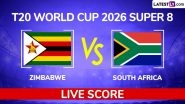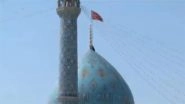Mumbai, January 15: The new rules for H1-B visa programme is expected to reduce the number of beneficiaries by nearly 10 per cent, said a research conducted by ratings agency Icra. The reduction would be driven due to a major amendment in the process of selecting H1-B visa beneficiaries -- with more emphasis to be given to those applicants with "advanced degrees".
The phrase "advanced degrees", explained officials of the United States Citizenship and Immigration Services (USCIS), refer to a masters or an even higher certification degree from an American varsity. H1-B Visa Blacklisted Firms: List of 26 Companies Named as Willful Violators by US Department of Labour.
Apart from filtering out the relative less-skilled applicant, the new H1-B visa rules will also adversely impact the IT majors in the United States, as they would not only find a smaller pool of offshore talent, but would have to pay the applicants more in accordance to their high educational skills.
Under the proposed amendments, USCIS would first select the 65,000 visas from the cumulative pool of regular as well as advanced degree holder applicants and 20,000 highly skilled H1-B visas would then be allotted among the remaining pool of unselected advance degree holder applicants, domestic rating agency Icra's vice president Gaurav Jain said.
"This will work against the Indian IT services sector (H-1B dependent employers) as their share of masters degree or equivalent for H-1B visas approved was approximately 27 per cent compared to 55 per cent for non-H-1B dependent employers," he said.
An entity is defined as H-1B dependent if more than 15 per cent of its employees are on an H-1B visa. The agency, however, said that credit profiles of players will remain stable as companies will be able to sustain free cash flows despite pressure on revenue growth and margins.
At present, when sufficient number of petitions needed to reach the regular cap or advanced degree exemption are received, USCIS selects qualifying position towards the H1-B advance degree exemption first through lottery and the unselected advance degree applications are merged with the pool of regular applicants for selection process towards cap of 65,000, it said.
Indian companies have started to ramp up onshore hiring with the visa issuance norms being tightened by restricting the entry of entry-level programmers earlier coupled with increasing compliance requirements adding to cost pressures, it said.
In its sample of companies, Icra said the share of offshore revenues reduced from 43.2 per cent in FY16 to 40.3 per cent in FY18, and has subsequently increased to 42.2 per cent in H1FY19.
(With PTI inputs)
(The above story first appeared on LatestLY on Jan 15, 2019 11:40 PM IST. For more news and updates on politics, world, sports, entertainment and lifestyle, log on to our website latestly.com).













 Quickly
Quickly


